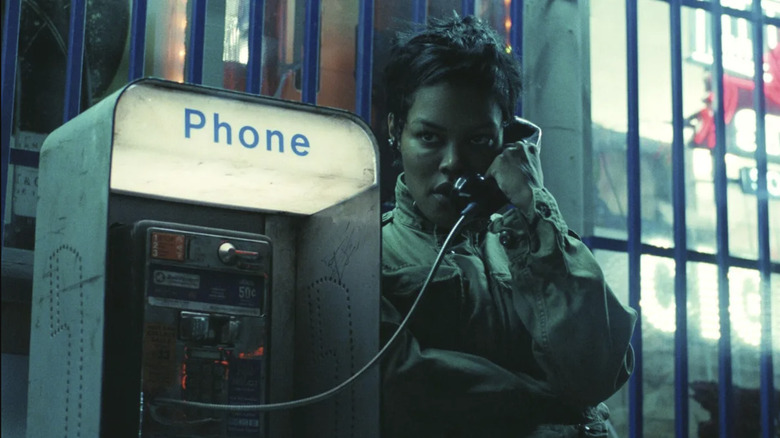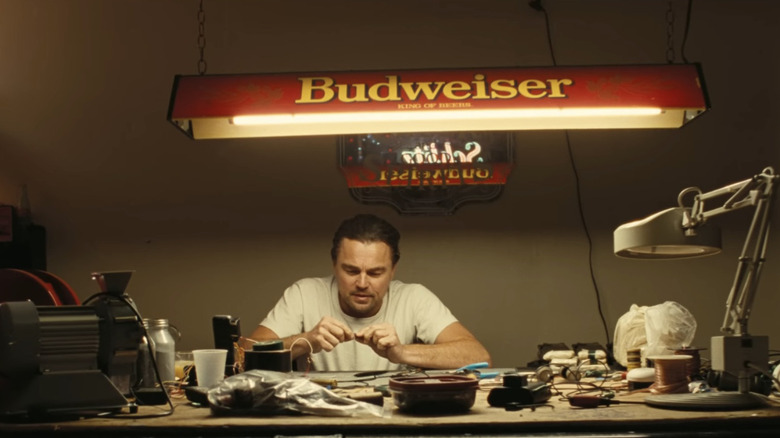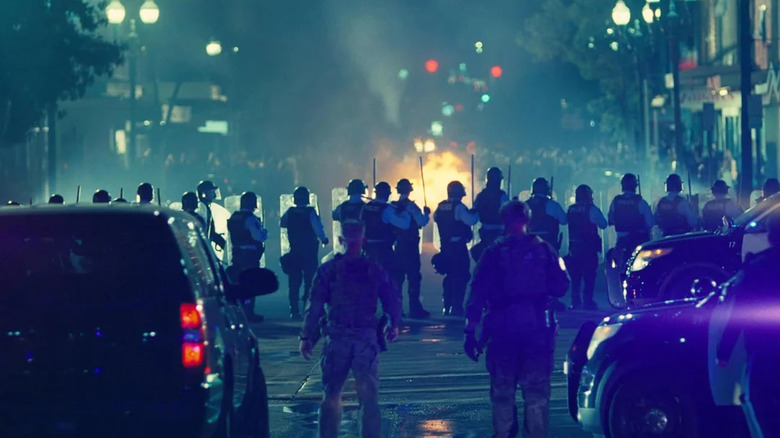How One Battle After Another Completely Changes The Book That Inspired It
Paul Thomas Anderson has been a fan of author Thomas Pynchon for years, having already loosely adapted "Inherent Vice," but PTA has been trying to figure out how to adapt "Vineland" for about two decades. Known for his dense, complex, politically driven novels that blend historical fiction, satire, and philosophy, Pynchon specializes in eccentric characters in sprawling plots tackling paranoia, conspiracy, and the chaotic nature of everyday life. He's a writer who loves to mix high-concept themes with boorish humor, weaving them together with mathematical precision. There's no such thing as "passive entertainment" when it comes to Pynchon's work, so the fact that Anderson has used his novels as the basis of his films more than once is a testament to his talent and taste.
"Vineland" serves as the basis for Anderson's electrifying "One Battle After Another," but the film takes some major liberties with the source material, so much so that calling it an adaptation is not an accurate description. A reimagining, perhaps, or even a modernized update, but certainly not a 1:1 reconstruction. Instead, Anderson has taken the themes and spirit of the novel and incorporated a story more in line with what is happening politically in our world today. "'Vineland' was always going to be too hard to adapt, so I stole the parts that spoke to me and just started running like a thief," Anderson told star Leonardo DiCaprio in an interview with Esquire. "I guess that's what all us writers do — we're f***ing thieves." He continued:
"I always liked the structure of 'Les Misérables.' You have a wild and crazy first act, and then you settle into the story, and you must pick up the pieces of the wreckage, or you must reckon with the choices you made in the first act. This is a very good dramatic structure."
This was the right call for Anderson to make, because "One Battle After Another" is incredible, and one of the most politically relevant films released by a major studio ... possibly ever.
One Battle After Another reflects the current political climate
"Vineland" is set in 1984, the year Ronald Reagan was re-elected, while "One Battle After Another" is firmly set during our current timeline (or close to it). The flashbacks in "Vineland" thrust the characters back into the 1960s, while "One Battle After Another" shows us the years before leading man Ghetto Pat/Bob Ferguson (DiCaprio) and his partner Perfidia Beverly Hills (Teyana Taylor) had their daughter (Chase Infiniti), who is now 16. This puts their flashback antics somewhere around the end of George W. Bush's administration and the start of Barack Obama's first term. This jump in timeline shifts the focus of PTA's politics.
While Anderson's adaptation retains much of the emotional resonance and interpersonal dynamics of the original characters, it transforms the novel's deeper sociopolitical critique. In "Vineland," the villainous Brock Vond's zealous prosecution of the War on Drugs — a direct extension of Reagan-era authoritarianism — is transformed into Sean Penn's Colonel Lockjaw's xenophobic crusade against immigration. But Lockjaw isn't acting alone; he is desperately seeking the approval of a shadowy cabal of wealthy, white supremacist elites who manipulate government power to enforce a vision of America that is "safe and pure," sanitized of difference, dissent, and democracy. It's a smart move, and one that allows Anderson to showcase that to critique the current threats of ICE, the rise in fascism, and the dangers of capitalism is to critique the evergreen nature of America's racism and xenophobia.
Vineland and One Battle After Another are different, but they're telling the same kind of story
Meanwhile, the novel's freedom-fighter 24fps Collective, a symbol of radical media resistance, is reimagined as the French 75 revolutionaries, who carry forward a more globalist, insurgent spirit with a rallying cry that's as urgent as it is uncompromising: "Free borders! Free choices! Free from fear!"
The character names, timelines, or presidential administrations at the center of both "Vineland" and "One Battle After Another" don't need to be the same, because the message of both stories remains the same. "In other words, for 20 years I've had all these various strands, and in a way, none of them ever went out of style, because whatever seems to be happening politically seems to always be the same," Anderson told DiCaprio during the same Esquire interview. "Same sh**, different year."
These stories don't just flirt with politics; they draw a hard, uncompromising line in the desert and tell you there is no neutral side to take. You're either aligned with the mission of the revolutionaries, fighting tooth and nail for the liberation of the oppressed, or you're serving the interests of the regimes hellbent on constructing a whitewashed, sanitized nightmare of America. The stakes in this movie are life or death, because like Pynchon's novel and the real life we're living in, it is.
"One Battle After Another" is now in theaters.


